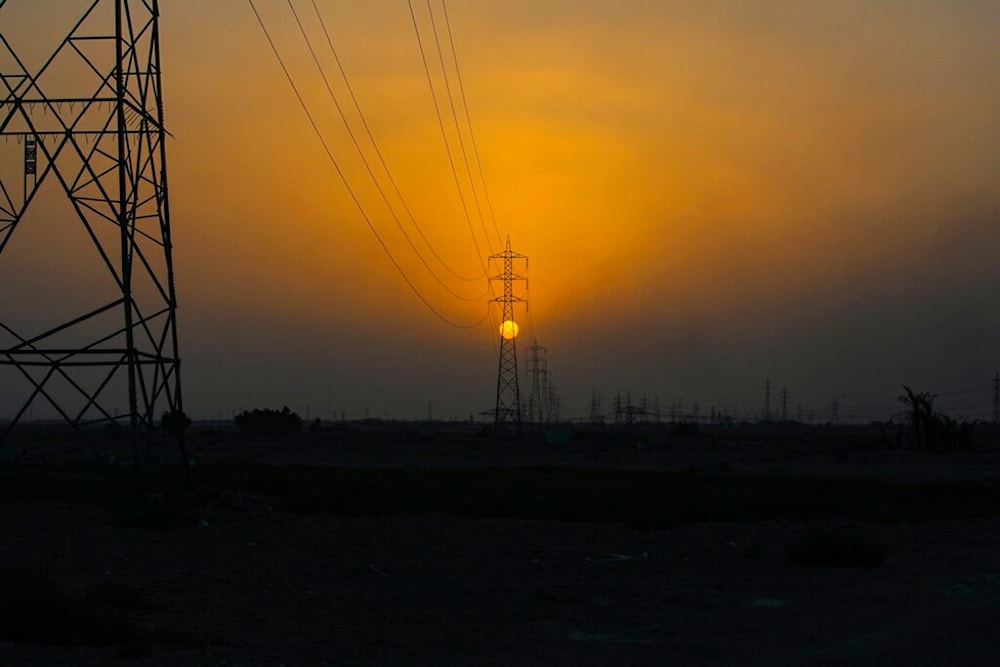Iraq lacks immediate alternatives to replace Iranian energy imports
A senior electricity ministry official tells Reuters that the Iraqi "government has started to implement urgent measures to reduce the impact of the US decision on Iraq power supply."
-

The sun sets behind the transmission lines of electric power from Iran to Iraq in Basra, Iraq, on July 29, 2021 (AP)
Iraq currently lacks immediate alternatives to replace the energy imported from Iran, a shortfall that will pose a major challenge in meeting domestic electricity demand, particularly during the summer months, Reuters reported, citing three energy officials.
Earlier on Sunday, a US official confirmed that Washington has opted not to renew a waiver that allowed Iraq to purchase electricity from Iran without violating sanctions.
"Government has started to implement urgent measures to reduce the impact of the U.S. decision on Iraq power supply," one senior electricity ministry official told Reuters.
The waiver, which expired on Saturday, was not extended by the US Department of State, according to a statement from the US embassy in Baghdad.
This decision is part of President Donald Trump's "maximum pressure campaign" on Iran, aimed at halting "Iran’s nuclear threat, curtail its ballistic missile program and stop it from supporting terrorist groups,” the embassy indicated.
The statement urged Iraq "to eliminate its dependence on Iranian sources of energy as soon as possible."
Iraq, despite its substantial oil and gas reserves, has faced persistent electricity shortages due to years of war, corruption, and mismanagement. The country has become heavily dependent on Iranian electricity and natural gas imports to meet its energy needs.
The waiver that expired applied to direct electricity imports, but it remains unclear whether Iraq will be permitted to continue importing gas from Iran to power its plants.
While the US embassy stated that electricity imports from Iran accounted for just 4% of Iraq's total consumption, Iraq’s Ministry of Electricity spokesperson, Ahmad Moussa, warned that banning gas imports could result in the loss of more than 30% of Iraq's electricity supply, adding that the government is actively seeking alternative energy sources.
Moussa noted that for the past two months, Iranian gas had not been supplied to power plants in Baghdad and the central Euphrates region, while supply to southern power plants had been unstable.
A senior official at the Ministry of Electricity, speaking on the condition of anonymity, indicated that the ministry had yet to receive official notification regarding the US decision on gas imports.
The official asserted that Iraq could lose up to 8,000 megawatts from power stations running on Iranian gas, as well as an additional 500 megawatts of electricity directly supplied by Iran.
Iraq has set aside 7.5 billion euros in a bank account for payment to Iran for gas, of which approximately 6.5 billion euros have been paid since the start of the year. However, these funds can only be used for specific purposes, such as purchasing food, medicine, and other humanitarian goods.
Iraq’s power grid at risk of collapse
On his part, Atwan al-Atwani, chairman of the Iraqi parliamentary finance committee, warned on Sunday that cutting off Iranian gas imports could lead to a collapse of Iraq’s power grid this summer, Shafaq News reported, citing a statement.
During a meeting with the US Ambassador to Iraq, Daniel Rubinstein, the two discussed the impact of US sanctions on Iraq’s electricity sector.
Al-Atwani emphasized the necessity of continued dialogue to sustain stable relations between the two countries and urged the US to extend sanctions waivers following their suspension by President Trump's administration.
“Without Iranian gas, Iraq’s power infrastructure would face severe strain, especially in the summer, as no immediate alternatives are available,” underscored al-Atwani.
He acknowledged Iraq’s efforts toward energy independence but pointed out that gas investment projects would take years to become operational.
The statement also noted that natural gas imports remain exempt from US sanctions for the time being.
Additionally, al-Atwani called on the US Treasury Department to reassess sanctions on Iraqi banks, arguing that they have undermined economic stability despite Iraq’s strides in compliance and financial transparency.
In response, US Ambassador Rubinstein expressed understanding of Iraq’s concerns and assured that Iraq’s position would be communicated to Washington.
Read more: US to send diplomat to Baghdad for Kurdish export of Iraqi oil

 4 Min Read
4 Min Read








